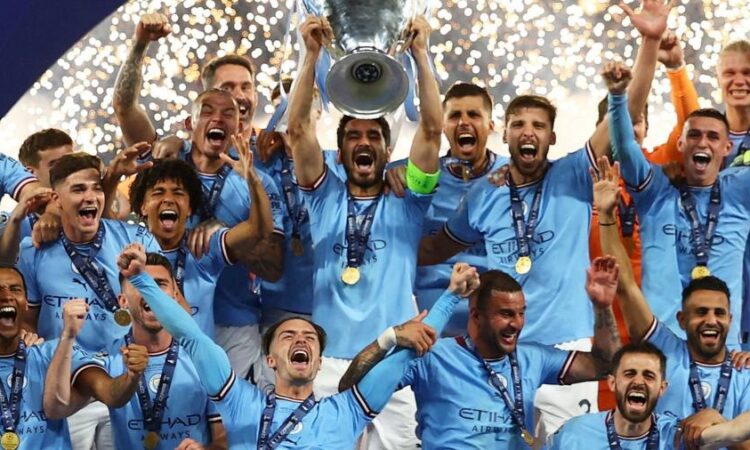
When Manchester City lifted their first Champions League trophy in Istanbul on Saturday night, the Gulf’s rapid takeover of European football’s commanding heights was complete. City’s owner, watching his team in a competitive match for the first time since 2010, is the Emirati royal Sheikh Mansour bin Zayed Al Nahyan. His Qatari neighbours hosted this winter’s World Cup. Saudi clubs have spent the past few months signing some of the world’s best players, including Cristiano Ronaldo. Meanwhile, in the week of City’s triumph, Saudi Arabia effectively took control of golf’s PGA tour.
No region outside western Europe has ever had such a grip on football’s shiniest baubles. Many fans lament this — partly because of the Gulf monarchies’ mistreatment of women, migrants, LGBT people and dissidents, and partly from a feeling that football shouldn’t be for sale. There are still attempts to contest the Gulf’s dominance. The Premier League has referred City to an independent commission, which will review more than 100 allegations of financial rule-breaking — charges that the club denies. But football faces a dilemma. Gulf money has made the contest at the top of the European game much more exciting than it would have been otherwise.
Look at how Emirati funds lifted Manchester City from joke status into football’s trendsetting team. Every City fan in Istanbul over the age of 30 could remember the years of stumbles. In 1998-1999, the team spent an embarrassing season in English football’s third tier. City’s fans often treated their club almost as the footballing branch of Monty Python. They waved inflatable plastic bananas, and sang, surreally, “We’re not really here.”
That old City survives only in the form of songs, dances and memories. On the field, the Emiratis transformed the club. Their money bought players who won trophies, in the process wiping out the old football cliché that held: “You can’t buy a winning team.”
In fact, if you want a winning team, you have to buy it, with salaries and usually with transfer fees, too. The ugly truth of football economics is that the only way for Cinderella to become a princess is to be bought by a prince.

City are following in the oil-fuelled slipstream of Chelsea, who were bought by Russian oligarch Roman Abramovich in 2003. The two clubs between them won 12 of the last 19 English titles. They are also the only European clubs since 1999 to win a Champions League for the first time. Oil money has allowed two upstarts to beat the established powers.
English football could have taken a different route, rejecting Gulf money. It could have followed Germany, with its “50 + 1 rule”, which states that club members must hold a majority of voting rights. That stops outsiders from taking over clubs. The rule is often praised by football traditionalists. However, it means that German football has no oil-fuelled upstarts. The consequence is that the German club with historically the highest revenues, Bayern Munich, faces no serious challengers, and has won 11 league titles in a row. The rule also means that no other club from Europe’s biggest economy has a hope of winning the Champions League, whereas three different English clubs have won in just the last five seasons. Now yet another oil-fuelled challenger may be emerging: Saudi-owned Newcastle United, freshly qualified for the Champions League.
Gulf money will probably keep shaping football for a while yet. Qatari Sheikh Jassim bin Hamad Al Thani is bidding to buy Manchester United from the Glazer family, and Saudi Arabia may bid to host the 2030 World Cup, perhaps jointly with Greece and Egypt.
The monarchies’ spending on football is often explained as a cunning plan to “sportswash” their reputations, or as an “investment” to diversify their economies away from oil and gas — even though football clubs typically lose money, especially given the salaries that the Gulf royals pay.
In fact, there is a simpler explanation for why these people went into football: it’s fun. It makes their friends and neighbours jealous. It’s an affordable hobby for billionaires. And they face almost no competition from their peers elsewhere. Abramovich and other Russian oligarchs have been expelled from the sport since Russia’s invasion of Ukraine, few Chinese ever entered, while most Americans who buy into football want to make profits from their clubs, and therefore balk at paying the salaries that would allow their teams to compete with the likes of City.
So European football has become a status competition between Gulf monarchies, with City showing the potential to build a dynasty. The men’s team coach, Pep Guardiola, in situ since 2016, has constructed one of the great teams of football history, even if they didn’t show it in Istanbul. This season they have won the Treble of Champions League, Premier League and FA Cup. They attack, they are tactically innovative, and the current squad is young enough to remain dominant. Early on Sunday morning, exhausted in triumph, Guardiola warned Real Madrid, who have won 14 Champions Leagues to City’s one: “We are on our way. If they fall asleep, we will be catching them.” That may not have been a joke.






